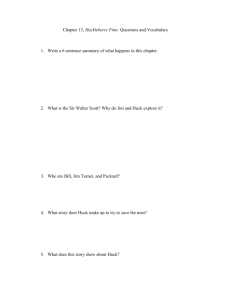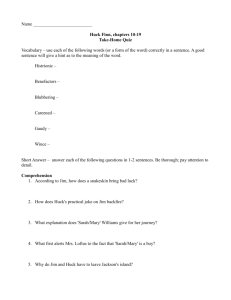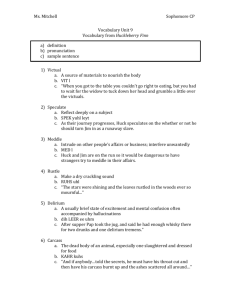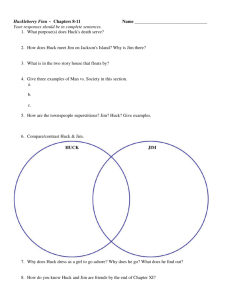Huck Finn and the American Experience “History is bunk,”
advertisement
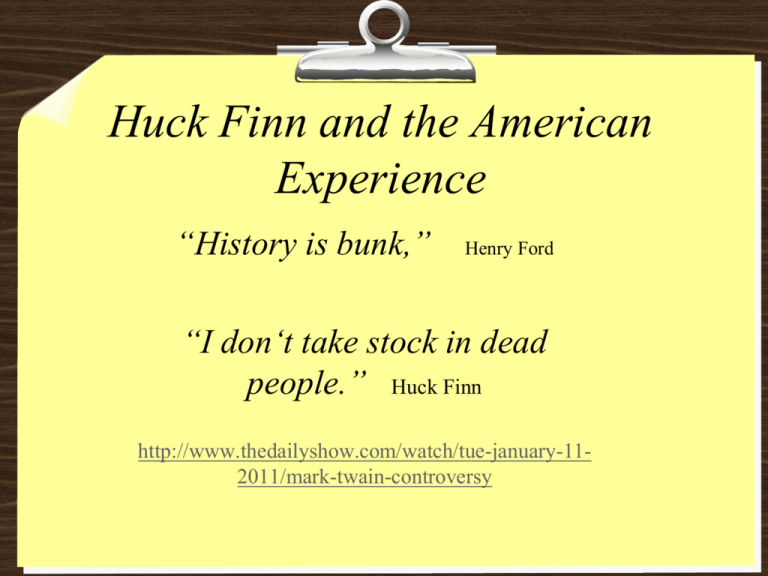
Huck Finn and the American Experience “History is bunk,” Henry Ford “I don‘t take stock in dead people.” Huck Finn http://www.thedailyshow.com/watch/tue-january-112011/mark-twain-controversy • 1. INTELLECTUAL VERSUS SIMPLE A. Pioneers start from scratch. . . they have very little to use from the past. Much of Huck Finn makes fun of culture and accepted values. eg. Even Shakespeare is somewhat mocked. • B. Twain has a certain disdain for the intellectual, even though he spent much time with the wealthy and educated. http://www.colbertnation.com/the-colbert-report-videos/369991/january-052011/huckleberry-finn-censorship • 2. RESTLESSNESS VERSUS TRADITION The book is written in 1885 but looks back to the past, a past which was more simple and even peaceful, before the Civil War. Nonetheless, Huck’s restlessness as well as the violence and death he and Jim encounter at times on the river, suggest that changes are needed. Chapter 6 • Huck never cared for school, but he continues to go just “to spite pap.” Have you ever done something you did not like just to spite someone? In your opinion, is spite a good reason to do something? Why or why not? Think of an instance when it might actually be beneficial. • 3. FAITH IN DEMOCRACY VERSUS OBVIOUS PREJUDICE IN SOCIETY There are several examples where Twain satirizes the treatment of blacks and the points out the hypocrisy of the establishment. Those in places of position are often satirized. . . The Grangerfords. . . Wealthy, yet hypocrites --the King and Duke are funny, but also cruel and evil • 4. FREEDOM VERSUS CONFORMITY Huck becomes used to the widow’s home, yet he longs for the adventure of the river. This is similar to many of us. . . Especially considering the American Experience Reflection ch. XI: “They’re After Us!” • Huck goes ashore disguised as a girl, hoping to find out what is going on in town, particularly what is being said about him and about Jim’s escape. • A. In about 100-150 words summarize the key events in this chapter, identifying any “satire” in the account. • B. In another paragraph explain what we learn about Huck’s changing perceptions of Jim. (Remember, Jim is a slave, and by society’s standards at that time, only a piece of property.) What Does Huck Finn Say? • 1. Tale of Adventure • 2. Picture of the World The setting for the story is 1840. What are some of the “pictures” Huck sees that influence him? a. Contrast the smug respectability of the Widow Douglass and Miss Watson and the harshness of Pap Finn, the representative of the rugged frontiersman and town drunk. b. The Sherpherdsons and Grangerfords can sit together in church on Sunday, express a sense of culture in art and music and books. But they too are hypocrites, particularly in their treatment of one another. Twain is exposing the hypocrisy of his day! 3. A Story of Moral Conflict & Development • Changes occur inside of Huck as he deals with struggles of the conscience. . . Should he listen to the dictates of society, or should he follow what his heart is saying. a. At first Huck doesn’t turn Jim in due to a promise he makes. He struggles with his decision, but he chooses to protect Jim. b. Later he lies to protect Jim from slave hunters, but he then has second thoughts. His deformed conscience tells him to turn Jim in; even the “Christianity” of the time tells him slavery in right. c. In the end he follows his more highly developed moral intuition. He tears up a letter that he’d written to the Widow Douglass, and thus turns his back on the faulty moral values he has learned from a hypocritical and corrupt society. Is “Huck Finn” a National Epic? • There is a “supernatural guide”. . . The Mississippi River • “Wanderer”. . .Huck is on an adventure, much like Odysseus • The hero has a cohort. . . .Jim • Kings and Dukes enter the story. . . .even though they are frauds • A voyage is central to the plot National Epic? • What separates this novel from classic epics is its humor and satire. Huck Finn is both serious and funny at the same time, much like Dave Chappelle is in his sketches on racism. It exposes hypocrisy and scorns the pretense of American society in the late 19th century. It is irreverent to much of what is held up by tradition. It exults the wonders of being young and free to explore the world. The most salient irony is that its heroes are a young boy and an escaped slave. Chapter XIV • 1. What does Jim think concerning the “wisdom of Solomon” and why? • 2. What does Jim think of speaking a foreign language? Explain. Creative Assignment • Choose a character from the novel. . . Jim, Tom Sawyer, Huck Finn, Pap, Widow Douglass, Judge Thatcher etc. • Do a series of tweets – at least ten – that explains the course of events in the novel, from your perspective of course, up until this point in the story.

